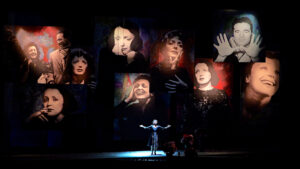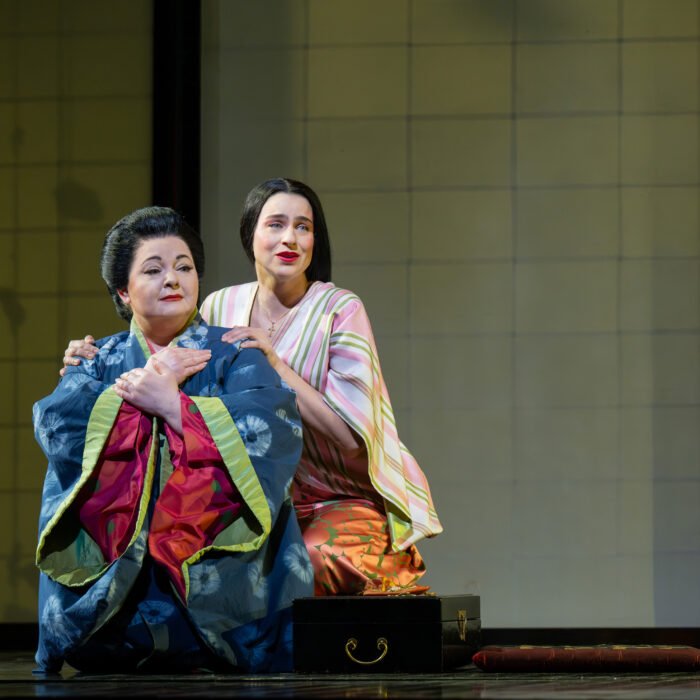
Teatro Carlo Felice Genova 2023 – 24 Review: Édith
By Alan Neilson(Photo: Teatro Carlo Felice)
The great French chanson singer Édith Piaf possessed one of the most naturally expressive and recognizable voices of the 20th century.
It was a raw, untrained voice, shot through with emotional honesty, born from her own tough and painful experiences of an early life spent in poverty and exposure to the seedy underbelly of society. In her recordings, you can hear the defiance and pain etched into her singing. She is passionate, unapologetic and sides with the people she knew all too well: the prostitutes, the bar tenders, the poor, the drunks, and those down on their luck. She was able to plumb emotional depths in a way that many singers of many genres could only dream. Yet, she was able to look upwards towards the stars and give voice to dreams of love and happiness, in which her voice would take on a reflective, sentimental gloss, although without betraying her deeper feelings. Many of her songs, such as “Non je ne regrette rien,” “La Vie en Rose,” and “L’hymne à l’amour” remain instantly recognizable today.
Born in Paris into extreme poverty in the early years of the 20th century, Piaf’s life was a catalogue of pain, struggle and often self-induced suffering caused through drug and alcohol abuse, interspersed with moments of intense happiness, which inevitably soon disappeared. She achieved worldwide fame, was befriended by singers, actors, intellectuals, and even a world champion boxer; she married twice and embarked on numerous love affairs, yet few were long-lasting; and happiness always remained one step away. The fates seemed to have conspired against her, yet she fought on, unbowed. In 1963, she succumbed to her drug and alcohol addiction, dying of liver cancer at the age of only 47.
Her life was one of such extremes that it was inevitable that fact, fiction, and rumor would become entangled over the years, so that today her public image has grown beyond the reality of the person. Opera Carlo Felice Genova’s decision to mark the 60th anniversary of her death with a commission for an opera about her life, therefore, comes as little surprise: Édith’s life was one made for the stage!
An Ambitious Project With Mixed Results
The composer Maurizio Fabrizio and librettist Guido Morra decided not to produce a work that would take in the entire sweep of her life, but instead focus on a single year; one that reflected the intensity of the love, the pain, the emotional tumult, and the sheer bad fortune that dogged her life.
The year in question was 1949. She had met and fallen in love with the boxer Marcel Cerdan. Although he was married, they appeared well-suited and were very much in love. Together, the world champion boxer and the star of chanson had the press enthralled. It was a time of intense happiness for Édith. Everything, however, was about to come crashing down. Cerdan, who had recently been beaten in a title fight by Jake LaMotta, was preparing to return to the USA for a rematch, where Édith happened to be singing in a series of concerts. Eager for his arrival, she persuaded him to fly instead of traveling by boat, which would have taken him two weeks. The plane never landed but crashed en route, killing all onboard. Édith was left devastated. The promise of happiness had once again been snatched from her grasp.
The opera, entitled “Édith,” is divided into a prologue and two acts, and Morra did a fine job keeping the drama moving along. Each act was dominated by a boxing match, the first in which Cerdan won the world title and the second in which he was defeated by LaMotta. These two scenes were two high points of the opera and, to an extent, undermined the primacy of Édith’s position. The character of Cerdan began to dominate, especially in Act Two, in which Édith was not even onstage until the second half. The opera therefore shifted focus away from “Édith the person” to “Édith’s relationship with Marcel Cerdan.” It was, nevertheless, a well-crafted drama that retained the interest of the audience throughout.
Fabrizio is an accomplished composer who knows exactly what he is doing. The score he created for “Édith” lay easily on the ear, containing a rich array of melodies that flowed seamlessly through the opera. There were rarely any passages that protruded rudely from the overall scheme. But it was all too slick, too comfortable, too easy. It was also too superficial. There was little in the way of pain and suffering. He never plunged into the depths of Édith’s emotional state. His use of pressing strings and aggressive brass did not cut it. Yes, they added tension and unease to the music, but their emotional impact was insubstantial, and they were overwhelmed by the ease of his music. Fabrizio’s ability to churn out light, accessible melodies is, however, certainly impressive, and his Act One love duet between Édith and Cerdan was beautifully crafted, perfectly capturing the depth and strength of their feelings.
Fortunately, Fabrizio decided against using quotations from Édith’s songs, which would have certainly turned the work into a piece of kitsch. The one exception was in Édith’s final aria, “Sono anch’io,” where he incorporated the briefest of references to “L’hymne à l’amour,” which was written by Édith Piaf and Marguerite Monnot in memory of Cerdan. This was a nice touch and fitted perfectly with Édith’s introduction to the aria, which she dedicated to the love of her life. What worked particularly well, however, was Fabrizio’s writing for the voice. This was on a different level. There was no superficiality. The vocal line was expertly crafted to bring out the full emotional forces the characters experienced, particularly, but not only, in the case of Édith. This was also noticeable in the writing for the chorus, whose music was emotionally strong, accessible, and dramatically well-focused.
Conductor Donato Renzetti produced a clean-sounding reading from the Orchestra di Opera Carlo Felice Genova, successfully capturing the melodic quality of the score and keeping a pleasing balance between the stage and the pit. The staging was designed by the students from dell’Accademia Ligustica di Belle Arti under the guidance of their teacher and director, Elisabetta Courir, who proved to be more than up to the task. The costumes were of the period, and the sets were suitably designed to provide a convincing backdrop. However, it was three scenes, in particular, that stood out. The design for the final scene was aesthetically strong and perfectly captured Édith’s sense of loneliness. Having just heard of Cerdan’s death, she insisted on fulfilling her engagement at the Versailles theatre. The stage was bathed in subdued lighting, suggestive of a nightclub. Édith stood in the middle, behind a microphone, and large pictures of the singer were lowered, one at a time, to form a collage of colored photographs. The opera was, therefore, allowed to finish as if it were a concert, with Édith singing her final song.
The other two scenes that were especially successful were the two boxing matches, which, due to the fact that the boxers had to sing while fighting, could have been problematic. The design cleverly captured the hustle and bustle of the matches; a single rope held by the crowd was used to form a ring, which moved in time with the surges and excitement of the crowd and provided the scene with the necessary energy. However, it was the decision to stage the fight in slow motion, in which the action was occasionally frozen to allow the boxers to sing, that proved to be the crucial idea. It did not detract from the fight itself and ensured the boxers had the necessary energy and focus to sing without compromising the dramatic tensions.
Video clips of Édith and Cerdan were successfully used to introduce memory into the presentation, while the clips from the fight between Cerdan and Jake LaMotta powerfully reinforced the ferocity and the violence of the fight.
Jicia Brilliantly Captures the Essence of Piaf
Soprano Salome Jicia made for a very credible Édith, with an expressively sensitive performance that captured both her emotional and physical fragility. Although she possesses a secure, agile, and resonant voice, and was able to imbue it with an array of strong emotions, moving swiftly from joy and happiness to intense sadness and defiance, she was always able to underpin them with emotional frailty. Her small physique magnified the effect, especially when she was placed alongside the boxers. The inner pain and suffering that she was able to bring to her interpretation when she was informed of Cerdan’s death was compelling. Her duets with Cerdan were beautifully realized, in which the two singers produced a strong connection. It was the last scene, in which she gives voice to her feelings in her final song, that really captured the essence of ÉdithPiaf. Standing alone on the stage, dwarfed by her own fame in the form of the large photos that surrounded her, she appeared as a diminutive, isolated figure, pouring out her pain and her passions before eventually collapsing onto the stage.
Marcel Cerdan was played by tenor Francesco Pio Galasso. His portrait of Cerdan successfully captured the boxer’s swagger and his strong feelings for Édith. He was clearly the dominant one in the relationship, with Édith often portrayed in a subservient role, cheering him on from the sidelines. He possesses an attractive voice; however, he was not always able to sustain the tonal beauty as he moved into the upper register. There was also a sensitivity to his singing that acted against him when set against Sgura’s LaMotta, who sounded far more aggressive. He did, however, bring a fine degree of expressivity to the role that allowed him to flesh out the character.
Mezzo-soprano Alena Sautier made a strong impression in the role of Édith’s assistant, Marie Hannequin. She possesses an attractive, fresh, open, and clear voice, that she used intelligently to create a sympathetic character who gave a real sense of caring for Édith.
Baritone Claudio Sgura, essaying the role of Jake LaMotta, really looked the part. He was brutish and physically strong, which his domineering and powerful singing only magnified. His LaMotta was no sportsman. His interpretation was of an aggressive, vicious and nasty man, which he successfully managed to convey through the curl in his voice.
Tenor Blagoj Nacoski produced a layered interpretation of Édith’s agent, Clifford Fisher. For him, everything was about money. He had no interest in Édith’s concerns and, for most of the evening, came across as selfish and slimy. Yet, when news came in of Cerdan’s death, he displayed a very human and sympathetic side to his character and tried to prevent her from going onstage. Nacoski possesses an engaging voice with a pleasing tone that he was able to imbue with the necessary emotions to convince.
Frankie Corbo was the local mafioso who arrived to put the squeeze on Cerdan to throw the fight with LaMotta. Bass Giovanni Battista Parodi produced a solid interpretation, but could have done more to emphasize the force of his threat through expressing his words with a more sinister tone and more varied use of dynamic inflections.
The minor roles were all well-parted. Mezzo-soprano Valentina Coletti produced a secure and clearly sung performance as Marinette Cerdan. Harry Burton, LaMotta’s second, and Joe Longman, Cerdan’s second, were given well-sung and convincing performances by baritone Marco Camastra and tenor Manuel Pierattelli, respectively.
Maestro del Coro, Claudio Marino Moretti, did a fine job with the Coro di Opera Carlo Felice Genova, which produced a strong, energetic performance.
Overall, it was a dramatically satisfying production in itself, although there were one or two areas that were not very effective. This was most notable during the strongly staged boxing scenes, in which Édith’s position was undermined. Not having her even appear in the first half of the second act allowed the roles of Cerdan and LaMotta to dominate, to the extent that she almost became an add-on. The second criticism, although this is more a matter of taste, was Fabrizio’s gushing melodies that flowed with such ease: no doubt he was attempting to replicate the essence of Édith the chanson singer, but they acted against the raging emotions that defined Édith the person.



